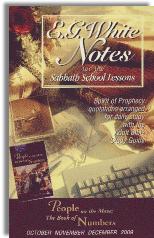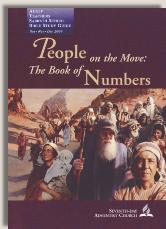|
||||||||||||||
Commentary on "The Sin of Moses and Aaron"
Day 2: Sunday, November 22, 2009
Overview
(Numbers 20:1-13) This section is reviewing the incident where God instructs Moses to speak to the rock at Meribah to obtain water for the Israelites. Instead of speaking to the rock, he hits it (twice) in an act of disobedience. One question asked is: “Why do you think that this meek, faithful and devoted servant of God showed such an uncharacteristic lack of faith and trust?” The lesson also encourages us to remember a time when we felt “pushed over the edge”—doing something rash and sinful. What lessons have we learned from this incident that could help prevent us from doing the same thing again?
Observations
Why Moses disobeyed is probably not all that important. Why it was displeasing to God is a more important point (aside from obvious disobedience). In Exodus 17, 40 years earlier, the Israelites had been at the same exact spot, Meribah. God instructed Moses to smite (hit) the rock. This rock that Moses smote (at God’s command), and that brought forth (living) water, represented Jesus. All throughout scripture Jesus=Rock (1 Cor. 10:1-4) and Living Water (John 7:37-39). By hitting “The Rock” a second time, Moses was, in a figure, crucifying Christ a second time. What was at stake was the integrity of God’s Word. Another point to consider is recognizing the special responsibility that belongs to God’s prophets (Deut. 18:20). While we all can make mistakes and succumb to our emotions, there’s a high price to pay that goes along with increased responsibility. It was a grave and costly sin. Moses paid a high price for his disobedience. While he was unable to enter the promised land because of his error, God was merciful to forgive his sin and Moses is still counted as one of the greats in Hebrews “Hall of Fame” (Heb. 11:23-29). God’s mercy was shown in two main ways: 1) The people received water despite Moses’ disobedience, and 2) God didn’t strike Moses down immediately for his sin. God still brought the miracle to pass and He didn’t humiliate Moses in the process.
Part of the account given in this section is an Ellen G. White quotation from Patriarchs and Prophets, p. 417. This is irrelevant—it merely gives speculation and emotional embellishment not recorded in scriptures.
The last section, which talks about “what we’ve learned from prior mistakes”, is really a bunny trail. We will make mistakes again because we’re human. If we’re relying on our self-control or self-discipline to avoid mistakes, we’ll be greatly disappointed. We must rely on the Holy Spirit living within us. Only with constant prayer and daily surrender to His will can we have any kind of victory in Christ. It’s all about Christ’s power in us, not our ability to control ourselves and our emotions.
Summary
- Why Moses disobeyed is less important than why it was displeasing to God. We all have varied reasons for why we sin/disobey.
- Moses’ disobedience compromised the integrity and accuracy of God’s Word. “The Rock”=Jesus; by hitting the rock a second time, he was, in a figure, crucifying Christ a second time.
- Moses disobeyed while he was in the process of speaking and acting as God’s prophet—God’s mouth and God’s spokesman. As a prophet with greater responsibility, the sin had serious consequences (not being able to enter the Promised Land).
- God’s mercy was huge. Moses deserved immediate death (Deut. 18:20), but instead he was denied entrance to the Promised Land. The miracle of flowing water from the rock still occurred.
- God will forgive all sin (though there are still consequences). Whether we sin or not is not what renders us useful to God—we all sin. It’s whether our heart is truly repentant (Do we have a whole heart for God?) Moses, while sinful, was a humble man (Num. 12:3). Despite his disobedience and sin, Moses is still considered one of God’s “greats”—see Hebrews “Hall of Fame” (Heb. 11:23-29).
- Ellen G. White quotes do not enlighten anything scripture has to say.They’re irrelevant.
- It’s not about improving our behavior; it’s about surrendering to God and His leading as we listen to the Holy Spirit within us. He helps us every step of the way.
GO TO DAY 3
Copyright 2009 BibleStudiesForAdventists.com. All rights reserved. Revised November 20, 2009. This website is published by Life Assurance Ministries, Glendale, Arizona, USA, the publisher of Proclamation! Magazine. Contact email: BibleStudiesForAdventists@gmail.com.
The Sabbath School Bible Study Guide and the corresponding E.G. White Notes are published by Pacific Press Publishing Association, which is owned and operated by the Seventh-day Adventist church. The current quarter's editions are pictured above.
Official Adventist Resources
Standard Edition Study Guide Week 9
Teacher's Edition Study Guide Week 9
Easy Reading Edition Study Guide Week 9
Search the Complete Published Ellen G. White Writings


